Introduction
Hello there, fellow garden enthusiasts! Ever thought of inviting a few thousand friends over to help with your gardening? And what if these friends are small, wriggly, and have an insatiable appetite for your kitchen waste? Say hello to composting worms, your garden’s new best friends!
Have you ever stopped to appreciate the quiet, relentless work happening right under our feet? The hustle and bustle of tiny creatures we often overlook, but who play an essential role in our ecosystem? This article invites you to peek into the fascinating world of these unsung heroes—composting worms! With their tireless wriggling and munching, these small but mighty beings transform waste into fertile soil, helping our gardens to flourish. In the process, they also help us reduce waste and lessen our environmental impact. This is the power of the humble composting worm.
The Discovery of Composting Worms
The use of worms in composting is not a new idea—it dates back thousands of years. However, the scientific understanding of this process was not fully realized until more recently.
Charles Darwin, the renowned naturalist and the father of evolutionary theory is also known for his extensive research on earthworms. His book “The Formation of Vegetable Mould, through the Action of Worms, with Observations on their Habits,” published in 1881, profoundly influenced our understanding of the role worms play in soil fertility. His work laid the foundation for modern vermicomposting practices.
Darwin observed that earthworms were nature’s first farmers, turning over the soil and enhancing its fertility long before humans discovered agriculture. He noted how they ingest soil and organic matter, excreting nutrient-rich castings that improve soil structure, nutrient content, and drainage.
While the use of worms in composting likely existed in some form in various cultures throughout history, it was Mary Appelhof, also known as “Worm Woman,” who popularized vermicomposting in modern times. Her book “Worms Eat My Garbage,” published in 1982, introduced the concept of worm composting as a feasible method of managing household waste.
Today, vermicomposting, or composting with worms, is a widely accepted practice. It’s used by gardeners, farmers, and households across the globe to reduce waste and improve soil health. So whether you’re a seasoned gardener or just curious about these wiggly wonders, read on to discover how composting worms can transform your garden and the planet!
Understanding the Science Behind Composting Worms
Decoding The Worm Digestive Process
You may be wondering how these wriggly wonders turn your banana peels and coffee grounds into black gold for your garden. Well, when it comes to composting worms, it’s all about the poop.
The Magic of Worm Poop
Yep, you read that right. Worm poop, or ‘worm castings’ as the garden sophisticates call it, is actually a top-notch soil amendment. It’s like the caviar of compost. Our little wiggly friends eat organic matter, and what comes out the other end (excuse my French), is rich in nutrients and beneficial microbes.
Why Composting Worms Matter
Boosting Soil Fertility
Composting worms are like the garden’s very own fertility clinic. They turn waste into nutrient-rich worm castings, which supercharge the soil, leading to happier, healthier plants.
Microbial Boost
It’s not just about the physical nutrients but also about the invisible helpers: microbes. Worm castings are rich in beneficial microbes that help break down organic matter, freeing up even more nutrients for plant use. This microbial boost makes your soil a veritable buffet for your plants.
Reducing Household Waste
Did you know if we stop feeding our food scraps to the landfills and start feeding them to the worms, we could seriously cut down on waste? That’s right! Your humble composting worms can eat their body weight in waste daily and don’t even need a thank you note.
Combatting Climate Change
When organic waste ends up in the landfill, it decomposes anaerobically, producing methane—a potent greenhouse gas. By composting our organic waste with the help of our wormy friends, we can significantly reduce methane emissions and combat climate change. Every little bit helps!
Educational Opportunities
A Window into the Natural World
Composting worms can provide a fascinating educational opportunity, especially for kids. It’s a window into the natural world and the decomposition process. Plus, having responsibility for maintaining a worm bin can be an engaging and enlightening experience, fostering a sense of environmental stewardship.
Improving Biodiversity in the Garden
Bringing Balance to Your Garden Ecosystem
Did you know that by introducing composting worms into your garden, you can enhance the biodiversity of your little patch of earth? The improved soil conditions created by worm composting attract more beneficial insects and organisms, creating a balanced and vibrant garden ecosystem.
So, as you can see, composting worms are more than just waste managers. They’re soil superchargers, climate warriors, teachers, and biodiversity boosters! They may be tiny, but their impact is enormous. Isn’t it time we gave these wriggly wonders the recognition they deserve?
Setting Up Your Own Composting Worm Farm
Choosing the Right Worms
The Dating Game for Worms
Remember that not all worms are created equal when setting up your worm farm. Red wigglers are the Casanovas of the worm world; they love to eat and breed in captivity. Nightcrawlers, on the other hand, are more of the lone wolves, preferring solitude and not ideal for your compost bin.
Choosing the right breed is crucial if you’re considering starting a worm farm. Red wigglers (Eisenia fetida) are often the first choice for vermicomposting. They’re efficient composters because they eat and reproduce quickly, turning waste into nutrient-rich castings at a rapid pace.
Remember, this isn’t a one-size-fits-all solution. You need to consider the climate, the type of waste you generate, and the space available. If you’re setting up your composting bin outdoors, you might want to consider European Nightcrawlers (Eisenia hortensis), as they are more resistant to colder climates.
Creating The Perfect Environment
Worms’ Favorite Playlist
Did you know that worms are party animals? Well, not exactly. However, they enjoy a moist, dark environment with lots of yummy organic material to feast on. Think of it as setting up a rave for your worms, minus the loud music and flashing lights.
To set up the perfect worm party, you’ll need a few key ingredients: A dark, damp space (moist as a wrung-out sponge), shredded newspaper or cardboard, and kitchen scraps. Worms are a lot like us when it comes to comfort. They don’t like it too hot or too cold. A nice, cozy spot in the garage or basement should do the trick.
Our Top Picks
Worm Factory 360
Presenting the Worm Factory 360, a high-quality, durable vermicomposting system made in the US, designed to transform your kitchen scraps into nutrient-rich compost. Compact and expandable, this system can house thousands of worms that are capable of consuming several pounds of waste each week.
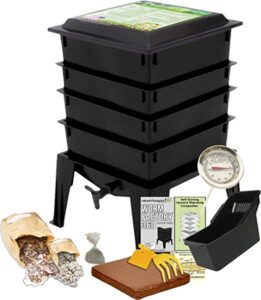
The Worm Factory 360 comes with a standard 4-tray size, but it doesn’t stop there. You can expand it up to 6 trays, following the provided instructions, making it the home composter with the largest volume available on the market.
The design of the Worm Factory 360 ensures a seamless composting process. Each tray has a grid bottom, encouraging worms to migrate upward as you add new food. Once you fill up a tray, you simply add another on top. When you harvest the compost from the bottom tray, it becomes the new top tray, creating a continuous loop system that works with the natural behavior of the worms.
Your worms will efficiently process your food waste into fine, nutrient-dense compost. A healthy worm community can consume about half its weight in food each day. If you start with 1/2 lb of worms, they can process a 1/4 lb of food daily. As your worm community grows, you can gradually increase the amount of food waste you add.
With the Worm Factory 360, composting becomes a hassle-free, odorless process that you can do all year round indoors. Plus, it comes with a 5-year limited warranty, giving you peace of mind and your rich, homemade compost.
Invest in the Worm Factory 360 for an innovative, efficient way to reduce waste, nurture your worm community, and enrich your garden with homemade compost. It’s more than a compost bin – it’s a comprehensive, user-friendly system for vermicomposting. Find Amazon’s best prices right here.
VermiHut Plus 5-Tray Worm Compost Bin
Introducing the VermiHut Plus 5-Tray Worm Compost Bin, the advanced solution to home composting. This state-of-the-art vermicomposting system comes standard with 5 trays, but the expandable design means you can add additional trays to suit your composting needs.
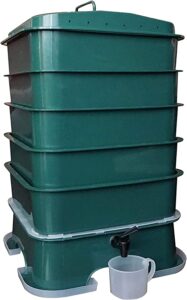
One of the standout features of the VermiHut Plus is the newly introduced M-board. This innovative addition increases air flow, improving compost efficiency and a healthier environment for your worms. With this advanced design, your worm colony thrives while rapidly transforming your kitchen scraps into nutrient-rich compost.
The VermiHut Plus has also integrated a unique V-board and a piece of coconut fiber into the air-vented lid. This duo works harmoniously to control moisture levels and effectively remove odor, ensuring your composting process remains clean, efficient, and free of unpleasant smells.
This worm compost bin also comes with a set of “shoes” to prevent unwanted intrusions into the bin. Further enhancing the user-friendly nature of the VermiHut Plus, the base and liquid tray form a single piece to eliminate complicated assembly, making setup a breeze.
Your VermiHut Plus 5-Tray Worm Compost Bin comes with a starter kit and a user manual to easily get you up and running. From seasoned green thumbs to composting beginners, everyone can appreciate the thoughtfulness and convenience built into the design of the VermiHut Plus.
Choose the VermiHut Plus 5-Tray Worm Compost Bin for an advanced, user-friendly composting experience. Embrace the power of vermicomposting and transform your kitchen waste into a precious resource for your garden.
New SUBPOD Mini Compost System
Introducing the New SUBPOD Mini Compost System, a revolution in home composting constructed from 60% recycled plastic. This compact composting powerhouse offers an innovative, environmentally friendly, and simple way to transform your food waste into rich compost for your garden.
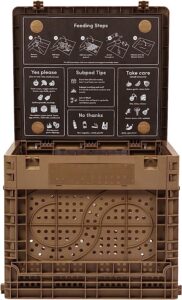
The SUBPOD Mini employs an aerobic system that promotes odorless microbes to accelerate composting, eliminating the unpleasant smells associated with anaerobic composting systems. Say goodbye to the unpleasant odors and pests, and say hello to efficient, odor-free composting.
Capable of composting up to 22 lbs (10kg) of food waste per week, the SUBPOD Mini acts like a miniature compost factory. The workers in this factory are your compost worms and the beneficial microbes that reside with them. Measuring 29.5 in length, 17.7in width, and 16.9 in height, the SUBPOD Mini is perfectly sized to cater to households of 1 to 4 people.
The SUBPOD Mini is also grow bag compatible. Its unique 360 ventilation system beneath the lid ensures fresh air circulates through your compost. With weekly aeration, your compost will mimic the pleasant aroma of a forest floor.
The simplicity of the SUBPOD Mini extends to its maintenance as well. Taking care of your waste is as easy as opening a lid, stirring in your scraps, and taking a seat. The worms beneath you do all the hard work, making composting maintenance a mere 5-minute-a-week task.
The New SUBPOD Mini Compost System is not just a compost bin – it’s a revolution in home composting. It transforms food waste management into a hassle-free, odorless, and efficient process, and its use of recycled plastic makes it an environmentally friendly choice. Invest in the SUBPOD Mini and join the composting revolution today! Check out Amazon’s best prices here.
Managing and Maintaining Your Worm Farm
Feeding Your Composting Worms
Worms aren’t picky eaters. Your kitchen scraps, coffee grounds, crushed eggshells, and even your old newspaper can be on their menu. However, avoid feeding them dairy, meat, or anything spicy. You wouldn’t want to give them a tummy ache, would you?
Feeding your worm colony can be a fun experience. You might start looking at your kitchen waste in a whole new light! As a general rule, worms love fruits, vegetables, coffee grounds, crushed eggshells, and even teabags.
However, just like certain humans, they have some dietary restrictions. Avoid feeding your worms meats, dairy products, or anything spicy, greasy, or oily. Remember, balance is the key to keeping your worms happy and healthy.
Dealing with Potential Issues
Bad Odor
If a strong, unpleasant smell comes from your compost bin, it could be due to overfeeding or poor ventilation. Remember, your worms can only eat so much. If food waste piles up, it will start to decompose anaerobically, leading to a foul smell.
Solution: Make sure only to feed your worms what they can consume in a reasonable timeframe, and always ensure your compost bin has enough ventilation. Adding some dry, shredded newspaper or cardboard can help absorb excess moisture and promote better air circulation.
Worms Trying to Escape
It might feel a bit like a prison break if you see your worms trying to leave the compost bin. This is generally a sign that the conditions inside the bin are not ideal. It might be too wet, dry, acidic, or lacking in oxygen.
Solution: Make sure your bin maintains a suitable environment for the worms. It should be as moist as a wrung-out sponge, well-aerated, and with a balanced pH. If the bin is too wet, add more bedding, like shredded newspaper or dry leaves to absorb the excess moisture. If it’s too dry, a little water will help.
Pest Infestations
Sometimes you might notice uninvited guests in your worm bin, such as flies, ants, or other pests. This can happen if the bin is not maintained properly or if you’re adding the wrong type of food scraps.
Solution: To prevent pest infestations, ensure your worm bin lid is secure and you’re not overfeeding your worms. Also, avoid adding foods that attract pests, like meats, dairy, and oily foods.
Worms Dying Off
If you notice your worm population declining or worms dying, there might be an issue with the bin conditions or the food you’re feeding them.
Solution: Check the conditions inside the bin. Is it too hot or too cold? Is it too wet or too dry? Are you feeding them something harmful? Identifying the cause of the problem is the first step in finding a solution.
Slow Composting Process
If you notice that the composting process is taking longer than expected, it might be due to a lack of worm population, poor bin conditions, or unsuitable food waste.
Solution: Increase your worm population, ensure optimal bin conditions, and provide suitable food scraps. Chopping or shredding the waste into smaller pieces can also speed up composting.
Maintaining a worm farm might seem a bit daunting, but with some knowledge and care, you can quickly troubleshoot and resolve most issues. Remember, happy worms make for a healthy garden!
Conclusion: Embrace the Wiggly Wonders
In the grand scheme of things, composting worms can be the superheroes of our gardens and the planet. They enrich our soil and help reduce waste, closing the loop in our food cycle.
There’s a whole world beneath our feet teeming with these wiggly wonders. Composting worms are an eco-friendly solution to reducing waste and enhancing the fertility of our soils. Not to mention, they also give us a fascinating glimpse into the natural world. So why not take the leap and start your own worm composting farm?
FAQs
Do composting worms bite?
No, composting worms don’t bite. They’re very friendly!
Can I use any worms for composting?
Red wigglers are the most efficient for composting, but other species can also be used.
Can composting worms survive in any climate?
Composting worms prefer temperatures between 55°F and 77°F.
What can I feed my composting worms?
They love vegetable scraps, coffee grounds, crushed eggshells, and shredded newspaper.
What if my compost bin starts smelling bad?
It could be a sign of overfeeding or lack of air circulation. Try reducing the amount of food or adding dry, shredded paper.
How fast do composting worms reproduce?
Red wigglers can lay an egg capsule approximately every 7 days, each of which can produce 2-3 worms. They multiply quite quickly!
How long do composting worms live?
Under ideal conditions, composting worms can live for up to 4-5 years.
Can I compost pet waste with worms?
While technically possible, it’s not recommended due to potential pathogens. It’s safer to stick to plant-based materials.
Why are my composting worms dying?
There could be several reasons – the bin could be too hot or too cold, it might be too wet or too dry, or there could be an issue with the food you’re providing.
Can composting worms handle fruit peels and citrus?
While worms can handle most vegetable and fruit waste, it’s best to avoid citrus as it can create too much acidity in the bin.
So there you have it, the wonderful world of composting worms. With a little care and understanding, you’ll have your own thriving worm farm, turning waste into wonderful, nutrient-rich compost for your garden. Happy composting!

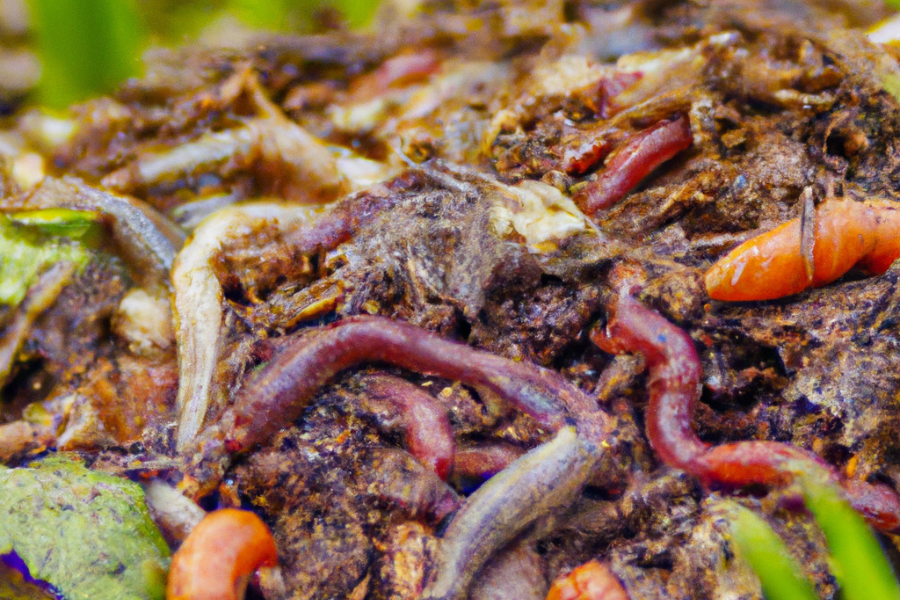
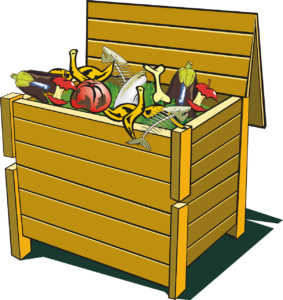
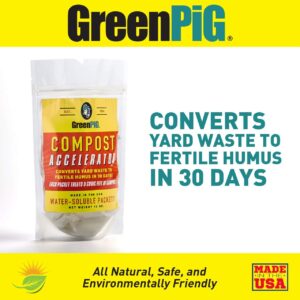

Pingback: Composting 101: In the (Sustainable and Eco Friendly) Beginning
Pingback: Mushroom Compost: Care for Some Black Gold? - Eco Life Wise
Pingback: Ultracompost: The Future of Organic Farming - Eco Life Wise
Pingback: History of Recycling: A Journey From Trash to Treasure
Pingback: Compost Spreader: You and Your Garden's Best Friend
Pingback: DIY Compost Bin: Master the Art of Composting in Your Backyard - Eco Life Wise
Pingback: Benefits of Composting: A Complete Guide - Eco Life Wise
Pingback: Why are Natural Resources Important? Discover Earth's Treasures
Pingback: Sustainable Bedding: The Ultimate Guide | Eco Life Wise
Pingback: Organic Spices: Nature's Flavor Gems | Eco Life Wise
Pingback: Organic vs Inorganic Compounds: What's The Difference? | Eco Life Wise
Pingback: What is Permaculture? A Guide to Our Greener Future | Eco Life Wise
Pingback: Organic Nails: Unearthing the Ultimate Guide to Natural Nail Art | Eco Life Wise
Pingback: Importance of Biodiversity: More Than Just a Trend | Eco Life Wise
Pingback: Best Organic Coffee Brands: Your Ultimate Coffee Experience | Eco Life Wise
Pingback: Unlock Sustainability Goals: Ditch Non-Renewable Polymers for Eco-Alternatives | Eco Life Wise
Pingback: How Do I Start A Zero-Waste Lifestyle? | Eco Life Wise
Pingback: Recycling for Kids: Discover the Secrets of Saving the Planet
Pingback: Permaculture Design: Unlocking the Secrets to Sustainable Living | Eco Life Wise
Pingback: Electronics Recycling Process: 3 Important Tips | Eco Life Wise
Pingback: Self Sustaining Ecosystem: 10 of Natures Most Ingenious Secrets | Eco Life Wise
Pingback: How Do Self-sustaining Homes Manage Water And Waste? | Eco Life Wise
Pingback: Third Rock Kitchen Compost Bin Review: 10 Compelling Differences | Eco Life Wise